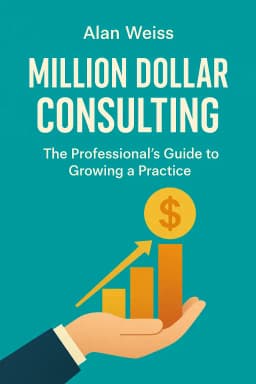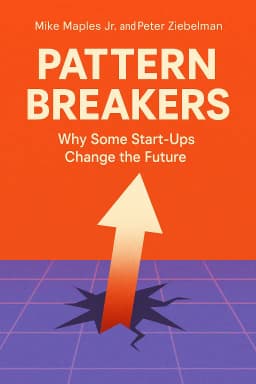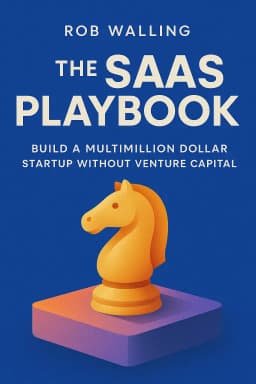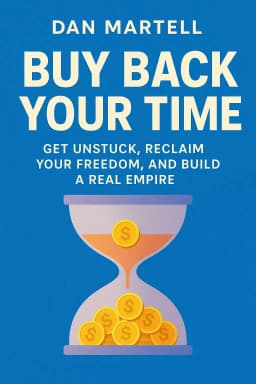
The Founder's Playbook: Deconstructing the 12-Month Path to a Million-Dollar Brand
Golden Hook & Introduction
SECTION
Socrates: What if building a million-dollar company wasn't about a single stroke of genius, but a replicable, step-by-step algorithm? We often idolize founders like Steve Jobs or Jeff Bezos as lone visionaries. But what if their real success came from a playbook that anyone can follow? That's the provocative promise of Ryan Daniel Moran's book, '12 Months to $1 Million.' It argues that with the right system, you can build a seven-figure brand in a year. But this isn't a get-rich-quick fantasy. It's a strategic deep dive into the mechanics of modern entrepreneurship.
Socrates: Today we'll dive deep into this from two perspectives. First, we'll explore the counterintuitive blueprint of putting people before product. Then, we'll dissect the founder's internal 'operating system'—the mindset required to turn pain into rocket fuel.
Socrates: I’m here with Jack, a tech entrepreneur who lives and breathes innovation and scaling. Jack, as someone who's built things in the tech world, does that idea of a 'repeatable algorithm' for a million-dollar business sound like hype, or is there something to it?
Jack: It's a bold claim, for sure. But in technology, we're always looking for scalable systems. We build software to be repeatable. So the idea of applying that same systems-thinking to the entire process of building a company... it's incredibly compelling. It shifts the focus from 'magic' to 'method'. I'm curious to see if the logic holds up.
Deep Dive into Core Topic 1: The Counterintuitive Blueprint: People Before Product
SECTION
Socrates: Well, let's get into that first part of the algorithm, which is maybe the most radical idea in the book for anyone from a product background: Choose your customer you even think about your product. The book's first step isn't "what to sell," it's "who to serve." What's your initial reaction to that?
Jack: It's counterintuitive, but it makes perfect sense. Most founders, especially in tech, fall in love with a solution. We build a cool piece of technology and then go looking for a problem it can solve. The book is arguing to reverse that entirely. Find a group of people, a tribe, understand their world, their pains, their identity... and build something for them. It's the difference between building a key and then looking for a lock, versus finding a lock and then crafting the perfect key.
Socrates: Exactly. And the book has some powerful examples of this in action. Take RXBAR. In 2013, the protein bar market was absurdly saturated. You had Clif, Quest, PowerBar... it was a bloodbath. But the founders, Peter Rahal and Jared Smith, weren't trying to sell to everyone. They were CrossFitters, and they saw that had a problem: there was no clean, no-BS protein bar that fit their ethos.
Jack: So they weren't market researchers in a lab; they were the customer.
Socrates: Precisely. They started with a person: the dedicated, ingredient-conscious athlete. So they created a bar with simple ingredients—egg whites, dates, nuts—and, in a stroke of genius, they put those ingredients in huge, bold letters right on the front of the package. It was a statement.
Jack: It's a signal. It says, "We're not hiding anything. We're one of you." That's a perfect example of niching down to scale up. In tech, we call this finding your 'beachhead market.' You don't try to conquer the world; you conquer a small, passionate island first. RXBAR's island was the CrossFit box. They created a product that signaled 'you belong with us.'
Socrates: And that signal was worth a fortune. Kellogg's bought them for $600 million just four years later. The book calls this 'Identity Marketing.' And it gives another, even wilder example: Poo-Pourri. How on earth do you sell a bathroom spray for $400 million?
Jack: I'm almost afraid to ask.
Socrates: The founder, Suzy Batiz, had this idea after being... inspired... by her husband's bathroom habits. But the product went nowhere until she stopped trying to sell a "bathroom freshener" and identified her: a woman who is tired of embarrassing bathroom situations. She then created this hilarious viral video with a prim, proper, English-accented woman sitting on a toilet, who looks at the camera and says, "You would not believe the motherload I just dropped!"
Jack: That's brilliant. It's disarmingly honest. The product isn't the hero of that story; the customer's relief is the hero. The brand says, 'We get it, and we've got your back.' It's the same principle Dollar Shave Club used. Their famous viral video wasn't really about the quality of the blades. It was a cultural statement against the absurdity of buying overpriced razors from a locked case in a drugstore. They sold the identity of being a smart, savvy person who's in on the joke.
Socrates: And that identity is what builds a brand, not just a product. It's the difference, as the book says, between making a little money for a short time, and building something that gets acquired for millions, or even billions.
Deep Dive into Core Topic 2: The Founder's OS: Turning Pain into Rocket Fuel
SECTION
Socrates: And building a brand like that, one that connects so deeply, requires more than just a good strategy. It requires a specific kind of founder. This brings us to our second idea: the founder's internal 'operating system.' The book argues that many, if not most, successful entrepreneurs have a 'chip on their shoulder.'
Jack: A drive that comes from a deeper, more personal place. It's not just about market opportunity.
Socrates: Not at all. It's about motivation. The author, Ryan Moran, tells this gut-wrenching story from his own life. He was in middle school, his parents had just separated, and he was feeling completely lost. A kid he really looked up to befriends him, and for a year and a half, he finally feels like he belongs. Then, one day, out of the blue, this friend says to him, "I find you really annoying. I’m only friends with you because I feel sorry for you."
Jack: Wow. That's brutal. Especially at that age.
Socrates: Devastating. He said he was so crushed, he spent the rest of the year hiding in the school's computer lab during lunch. But here's the twist: it was in that computer lab, in that isolation, that he taught himself how to build websites and write code. That painful moment of rejection became the unintentional fuel for the skills that eventually made him a millionaire.
Jack: That's heavy. But it's also incredibly real. So many of the most driven founders I know have a similar story. Maybe not the exact details, but that same core experience of being an outsider, of being underestimated, of having something to prove. It creates this relentless, almost irrational, drive. It's not just about the money; it's about rewriting an old narrative.
Socrates: The book argues it's a common trait, this ability to turn pain into fuel. And it connects to this idea of taking radical ownership. Moran has this powerful line: "No one is going to take care of me, so I will take care of myself." Is that a mindset you recognize in the entrepreneurs you admire, like a Bezos or a Jobs?
Jack: Absolutely. It's the defining trait. You look at the stories of Jeff Bezos, getting grilled by his old boss at a hedge fund about leaving a secure, high-paying job to go sell books on the internet. The logic didn't fully compute for his boss, but for Bezos, there was a conviction there that went beyond a spreadsheet. It was a pursuit. It was his to own.
Socrates: That word, 'pursuit,' is so important. The author talks about feeling depressed and empty after his first big eight-figure exit. He had dinner with Tim Ferriss and asked him if he ever questioned if all the success was worth it. And Ferriss told him, "Even if the thing isn’t worth it, the pursuit is."
Jack: That's it. That's the whole game. The person you become in the process of trying to achieve the goal is the real prize. The company, the product, the exit... those are just artifacts of the journey. The real product is the transformed version of yourself. It's a profound reframe for any founder who's burning out chasing a number on a screen.
Synthesis & Takeaways
SECTION
Socrates: So we have these two powerful, intertwined ideas from the book. First, the external strategy: build a world for a specific person, not just a product for everyone.
Jack: The 'what.' The playbook.
Socrates: And second, the internal engine: harness your personal story, even the painful parts, and reframe it as your fuel.
Jack: The 'why.' The operating system. It's a complete system, really. The strategy and the soul. You need both to not only succeed but to find the work fulfilling, to survive the grind.
Socrates: Exactly. So for everyone listening, especially the builders and creators out there, here's the question to walk away with, inspired by Jack's point: As you look at your next project, are you just designing the product, or are you designing the of the person who will use it?
Jack: And maybe more personally, what's that 'chip on your shoulder'—that old story, that moment of being underestimated—that you've been seeing as a burden, that might actually be your greatest source of power?
Socrates: A powerful question to end on. Jack, thank you for the insights.
Jack: This was great. A lot to think about. Thanks, Socrates.









